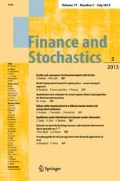Abstract.
In a market with transaction costs, generally, there is no nontrivial portfolio that dominates a contingent claim. Therefore, in such a market, preferences have to be introduced in order to evaluate the prices of options. The main goal of this article is to quantify this dependence on preferences in the specific example of a European call option. This is achieved by using the utility function approach of Hodges and Neuberger together with an asymptotic analysis of partial differential equations. We are led to a nonlinear Black-Scholes equation with an adjusted volatility which is a function of the second derivative of the price itself. In this model, our attitude towards risk is summarized in one free parameter a which appears in the nonlinear Black-Scholes equation : we provide an upper bound for the probability of missing the hedge in terms of a and the magnitude of the proportional transaction cost which shows the connections between this parameter a and the risk.
Similar content being viewed by others
Author information
Authors and Affiliations
Additional information
Manuscript received: March 1996; final version received: May 1997
Rights and permissions
About this article
Cite this article
Barles, G., Soner, H. Option pricing with transaction costs and a nonlinear Black-Scholes equation . Finance Stochast 2, 369–397 (1998). https://doi.org/10.1007/s007800050046
Issue Date:
DOI: https://doi.org/10.1007/s007800050046



